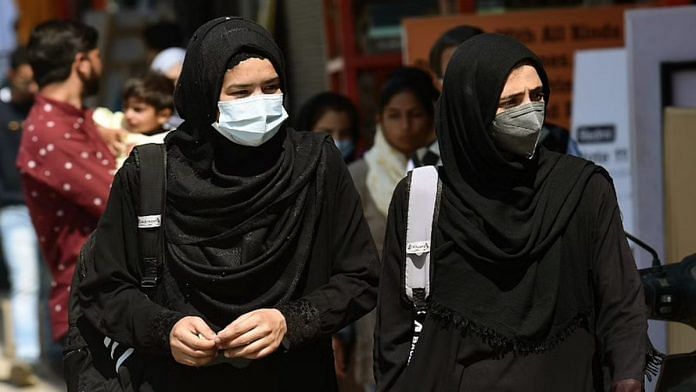New Delhi: A two-judge bench of the Supreme Court delivered a split verdict Thursday in the Karnataka hijab ban case, directing that the matter be listed before the Chief Justice of India for consideration to refer it to a larger bench.
Justice Hemant Gupta dismissed the appeals against the Karnataka High Court order that dismissed pleas filed by Muslim girls who challenged the state government order, which virtually banned them from wearing hijab in pre-university colleges. The girls asserted it was their right to wear hijab inside classrooms.
Justice Sudhanshu Dhulia, however, set aside the Karnataka government order. Referring to the Bijoe Emmanuel case which revolved around the national anthem, he said the present issue was “squarely covered” in the 1986 judgment.
In the Emmanuel case, three school children were suspended after they refused to sing the national anthem as it was against the “tenets of their religious faith”. The top court had held the suspension unconstitutional.
ThePrint explains the landmark decision of the apex court and why it came up in the hijab ban case.
Also Read: SC delivers split verdict in hijab case, refers matter to CJI for consideration to larger bench
Background
On 26 July, 1985, three school children in Kerala’s Kottayam — Binu Mol, Bindu and Bijoe Emmanuel — were suspended after they refused to sing the national anthem. The students stood silently during the morning assembly and said that singing the national anthem was against the religious faith of Jehovah’s Witnesses.
Jehovah’s Witnesses are “an association of persons who regard the literal interpretation of the Bible as fundamental to proper religious beliefs”.
V. J. Emmanuel, the father of three children, filed a writ petition on their behalf in the Kerala High Court saying that the suspension infringes upon children’s Fundamental Rights under Article 19(1)(a) (right to freedom of expression) and Article 21 (right to life or personal liberty) of the Constitution.
The HC dismissed the case observing that nothing in the national anthem was capable of offending one’s religious convictions following which Emmanuel moved the Supreme Court.
Also Read: Discriminatory to not essential religious practice — what appellants, state told SC in hijab case
‘Strange or bizarre… sincerity of beliefs beyond question’
In August 1986, the Supreme Court’s two-judge bench of Justices O. Chinnappa Reddy and M. M. Dutt heard the appeal against the Kerala High Court order. Writing on behalf of the bench, Justice Reddy said that even though some religious beliefs may appear “strange or bizarre”, the sincerity of the “beliefs” was beyond question.
The court said the test was whether a belief was “genuinely and conscientiously held as part of the profession or practice of religion”. It held that the children “genuinely and conscientiously” believed in their religious conviction.
The question was not whether the national anthem offended anyone’s religious susceptibilities, but whether their belief permitted them to stand up for the national anthem, the top court said.
“The students who are Witnesses do not sing the Anthem though they stand up on such occasions to show their respect to the National Anthem,” it said. “They desist from actual singing only because of their honest belief and conviction that their religion does not permit them to join any rituals except it be in their prayers to Jehovah their God.”
‘Tradition, philosophy & Constitution’
Article 25, which guarantees the freedom of conscience and religion, is an ‘Article of faith’, recognising the ability of an ‘insignificant majority’ to find its identity in the Constitution, the top court had said.
Touting it as the “real test of true democracy”, the court had reiterated the principle that Article 25 protects each and every individual’s freedom of conscience and religion. Tradition, philosophy, and the Constitution all preach and practice tolerance, the judges said. Efforts to dilute tolerance, therefore, must be resisted.
The court found that the three expulsions were unconstitutional under Article 25. The expulsions violated the Fundamental Rights guaranteed under the Constitution, it noted.
Also Read: ‘Women fighting against hijab in Islamic countries’: Karnataka cites Iran to back its case in SC



